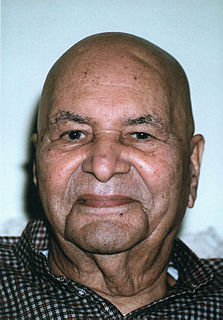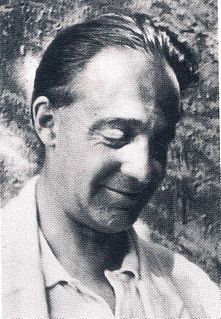A Quote by Philip K. Dick
The Logos was both that which thought, and the thing which it thought: thinker and thought together. The universe, then, is thinker and thought, and since we are part of it, we as humans are, in the final analysis, thoughts of and thinkers of those thoughts.
Related Quotes
The one who follows the thought is also a thought! The one who follows the thought IS in thought. When you know that both are thoughts, you are home. You are not at home, you ARE home. Then allow thoughts to arise and allow them to be followed. You remain as That unmoved and unconcerned Being. This is the highest understanding.
There is no unmoving mover behind the movement. It is only movement. It is not correct to say that life is moving, but life is movement itself. Life and movement are not two different things. In other words, there is no thinker behind the thought. Thought itself is the thinker. If you remove the thought, there is no thinker to be found.
By consequence, or train of thoughts, I understand that succession of one thought to another which is called, to distinguish it from discourse in words, mental discourse. When a man thinketh on anything whatsoever, his next thought after is not altogether so casual as it seems to be. Not every thought to every thought succeeds indifferently.
There is a thinking stuff from which all things are made, and which, in its original state, permeates, and fills the inter spaces of the universe.
A thought in this substance, Produces the thing that is imaged by the thought.
Man can form things in his thought, and by impressing his thought upon formless substance, can cause the thing he thinks about to be created.
It is remarkable how liberating it feels to be able to see that your thoughts are just thoughts and that they are not 'you' or 'reality.' For instance, if you have the thought that you have to get a certain number of things done today and you don't recognize it as a thought but act as if it's the 'the truth,' then you have created a reality in that moment in which you really believe that those things must all be done today.
The reaction against your own thought in itself lends life to thought. How this reaction is born is hard to describe, because it identifies with the very rare intellectual tragedies. The tension, the degree and level of intensity of a thought proceeds from its internal antinomies, which in turn are derived from the unsolvable contradictions of a soul. Thought cannot solve the contradictions of the soul. As far as linear thinking is concerned, thoughts mirror themselves in other thoughts, instead of mirroring a destiny.
What we take ourselves to be doing when we think about what is the case or how we should act is something that cannot be reconciled with a reductive naturalism, for reasons distinct from those that entail the irreducibility of consciousness. It is not merely the subjectivity of thought but its capacity to transcend subjectivity and to discover what is objectively the case that presents a problem....Thought and reasoning are correct or incorrect in virtue of something independent of the thinker's beliefs, and even independent of the community of thinkers to which he belongs. (p. 71)
Memories are thoughts that arise. They're not realities. Only when you believe that they are real, then they have the power over you. But when you realize it's just another thought arising about the past, then you can have a spacious relationship with that thought. The thought no longer has you in its grip.
My friend Heinrich Zimmer of years ago used to say, 'The best things can't be told,' because they transcend thought. 'The second best are misunderstood,' because those are the thoughts that are supposed to refer to that which can't be thought about, and one gets stuck in the thoughts. 'The third best are what we talk about.'
The beginning of freedom is the realization that you are not “the thinker.” The moment you start watching the thinker, a higher level of consciousness becomes activated. You then begin to realize that there is a vast realm of intelligence beyond thought, that thought is only a tiny aspect of that intelligence. You also realize that all the things that truly matter – beauty, love, creativity, joy, inner peace – arise from beyond the mind. You begin to awaken.





































